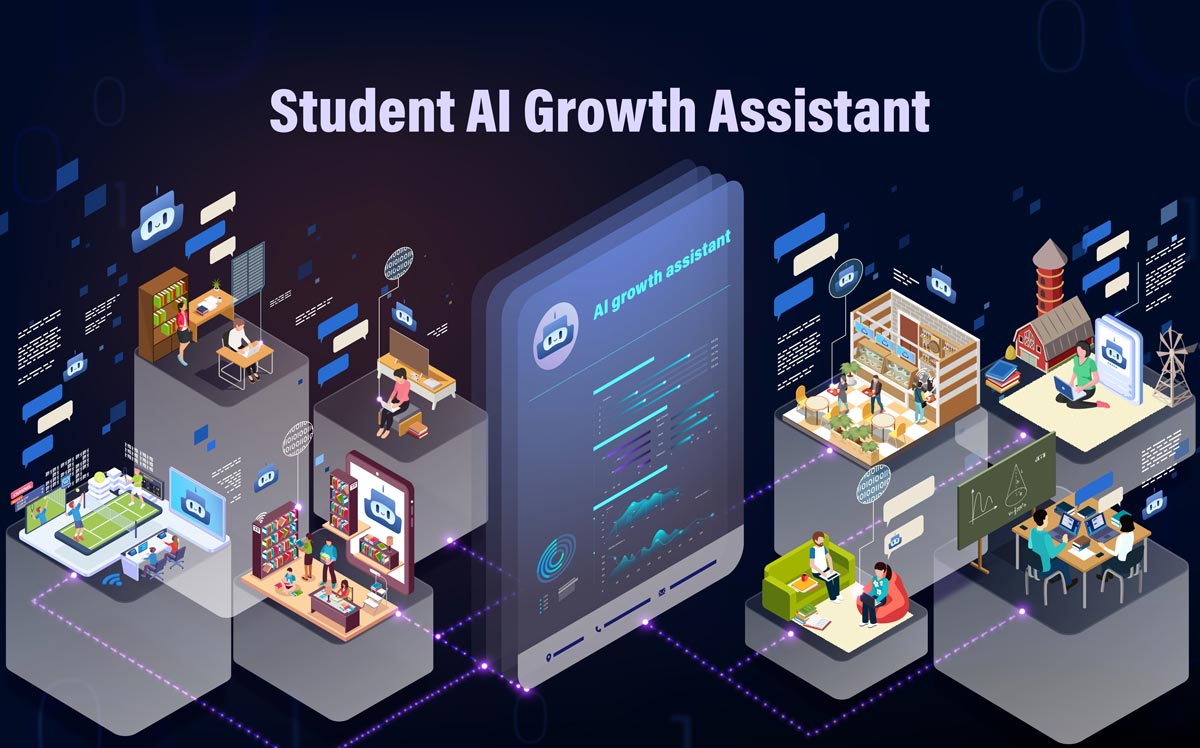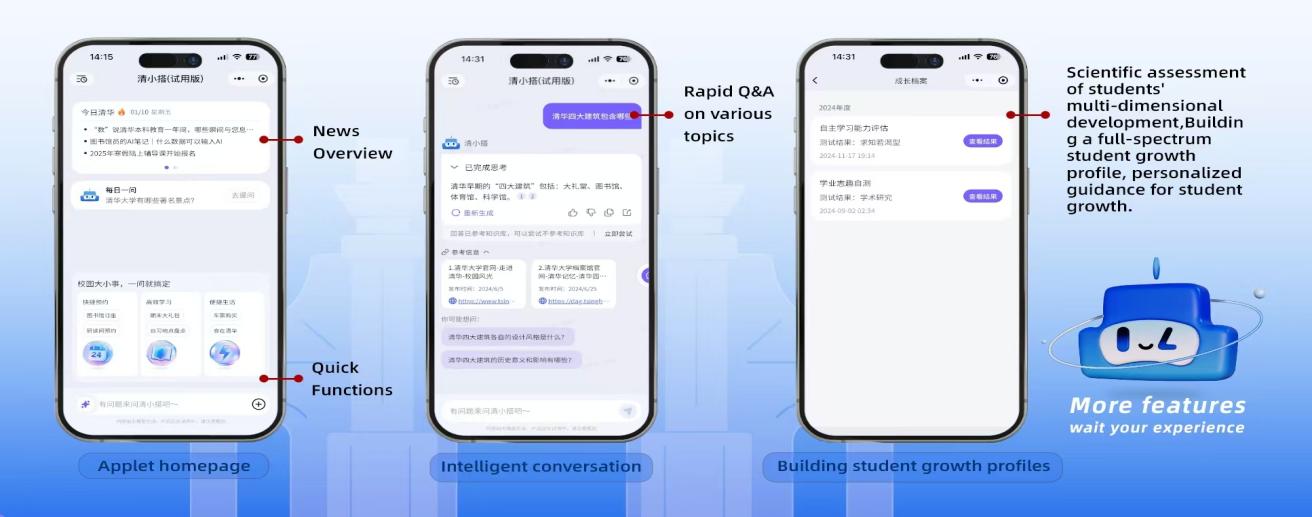Tsinghua University has unveiled a novel large language model tool, crafted by computer scientists, education experts, and psychologists, to support student development and self-insight.
In 2024, Tsinghua launched a suite of transformative artificial intelligence (AI) educational tools, including ‘Xiaoda’ — a student AI growth assistant. The chatbot-style interface was introduced to all incoming freshmen to enhance their learning experiences, offer life guidance, deepen their self-awareness, and promote their holistic development.
Driven by a university-developed large language model, Xiaoda is similar to well-known generative AIs such as ChatGPT. But unlike other portals, Xiaoda is designed specifically to encourage student skill development and academic growth.

Caption: Driven by a Tsinghua-developed large language model, Xiaoda is designed to encourage student skill development and academic growth. Credit: Tsinghua University
Providing growth support
The engineers designed the assistant to mimic personality features that encourage relaxed, approachable conversations, making students feel comfortable sharing their true thoughts and ideas, explains the program’s chief developer, Wang Huadong. “The AI tool is designed to respond appropriately as students develop and change, not merely to dispense information,” he says. “That’s why we named it ‘Xiaoda’, meaning ‘a companion at Tsinghua’.”
For example, the AI will prompt students to take regular quizzes to assess a range of factors —
from their academic aspirations to their ability to adapt to feedback and to reflect on performance. For these quizzes, students might be asked to rate their agreement with statements, such as: ‘When studying university courses, I set goals for myself and develop corresponding learning methods’. The AI can then provide a summary of the student’s learning tendencies and suggest useful resources — with each quiz result securely stored on the student’s file for ongoing self-reflection.
Last year, Liu Yuyao, a freshman majoring in computer science at Tsinghua, turned to Xiaoda for advice to improve his academic performance after his mid-term exams. Based on information about her learning style, the AI offered her advice based on self-efficacy learning theories, which encourage students to seek out escalating, but manageable challenges. The goal is to gradually and consistently boost students’ belief in their own abilities, helping them to grow without overwhelming or discouraging them.
The AI also asked follow-up questions to invite self-reflection, such as: ‘What are the advantages of completing practical tasks over learning theory?’ and ‘In which subjects do you think self-efficacy exercises are most effective?’
With access to much of Tsinghua’s internal data, Xiaoda can also assist students with a wide range of campus-related tasks, from course registration, office bookings and library seat reservations, to learning capacity assessments and help with study resource acquisition.

Caption: The chatbot-style interface of Tsinghua’s large language model student AI growth assistant was introduced to all incoming freshmen in 2024 to enhance student learning capacities. Credit: Tsinghua University
Building integrity into AI
Behind Xiaoda is an interdisciplinary research team who are conscious of mitigating the potential risks posed by such specialized AIs. “AI ethics and safety is crucial,” emphasizes Wang. “It was a priority when we were briefed by President, Li Luming, so we concentrated on algorithm design and data management that addressed AI bias, privacy and accuracy concerns.”
For example, to mitigate the well-known issue of large language model ‘hallucinations’ — in which AIs give inaccurate information as if it were fact — Wang’s team developed a system that only accessed the most relevant data to ensure more accurate and reliable responses. “We also prioritize traceability by making sure the AI clearly details information sources, and programmed the AI to notify users when the model lacks sufficient information and to clarify the limitations of its knowledge base,” Wang explains.
Developing the database that enabled this took months, as the relevant data was scattered across the campus. Wang’s team meticulously cleaned and labeled the university’s internal resources, including 1,500 WeChat official accounts, nearly 16,000 documents, and more than 200 websites.
We are also very attentive to security risks, such as data leaks, says Wang. “We held multiple meetings to address these concerns and decided to store all core data on campus and use anonymous data to protect students' personal information.” The team also signed agreements clearly stipulating that an individual’s data will not be stored or used for model training.
The team collaborates across departments to address AI bias. “We had many consultation sessions to avoid skewed outcomes from AI interactions with students,” says Zhan Yisi, an associate professor from the Center for Student Learning and Development at Tsinghua. “For example, when recommending courses, we helped design a system in which the AI remained neutral, presenting options for students to choose from rather than showing preference toward a subject.”
Developing an AI ecosystem
The AI is constantly evolving. A recent feature is ‘Agent Group Chats’. When prompted by a student question, Xiaoda can now invite AIs specialized particular courses — or even a specialized psychology AI called Emohaa — into a chat group with users to provide expert answers. For example, when Hu Hongyuan, a doctoral student majoring in quantum information, asked Xiaoda how to excel in physics, it brought a physics AI teaching assistant into a group chat to offer a course overview and suggest some key resources. “It’s really helpful for freshmen just starting university,” says Hu.
“Xiaoda aims to fully leverage advanced AI technologies such as autonomous intelligent agents and collective intelligence," says associate professor Liu Zhiyuan, the program chief executive, “future development will involve building upon mechanisms like AI agent group chats with AI teaching assistants, injecting new vitality into education and unlocking further possibilities.”
In the future, the hope is that each person at Tsinghua, and each department, will have a digital AI avatar, forming an interactive AI-agent-powered Tsinghua campus, says Wang. A function for agent group chat is already in testing, and a web-based portal for integrating AI agents is also being developed.
Future iterations of Xiaoda may also support additional student development resources, says Zhan. These might be programs designed to foster innovation potential, research skills, and social-emotional competencies, she speculates. “From an educational perspective, we believe that Xiaoda represents a promising effort to harness AI technology to empower personalized education,” she says. “Our team hopes that this AI technology can enhance the dignity, capacity, and welfare of our students — and one day extend these benefits beyond the university.”

Caption: In the future, each person at Tsinghua, and each department, will have a digital AI avatar that will populate an interactive digital Tsinghua campus. Credit: Tsinghua University